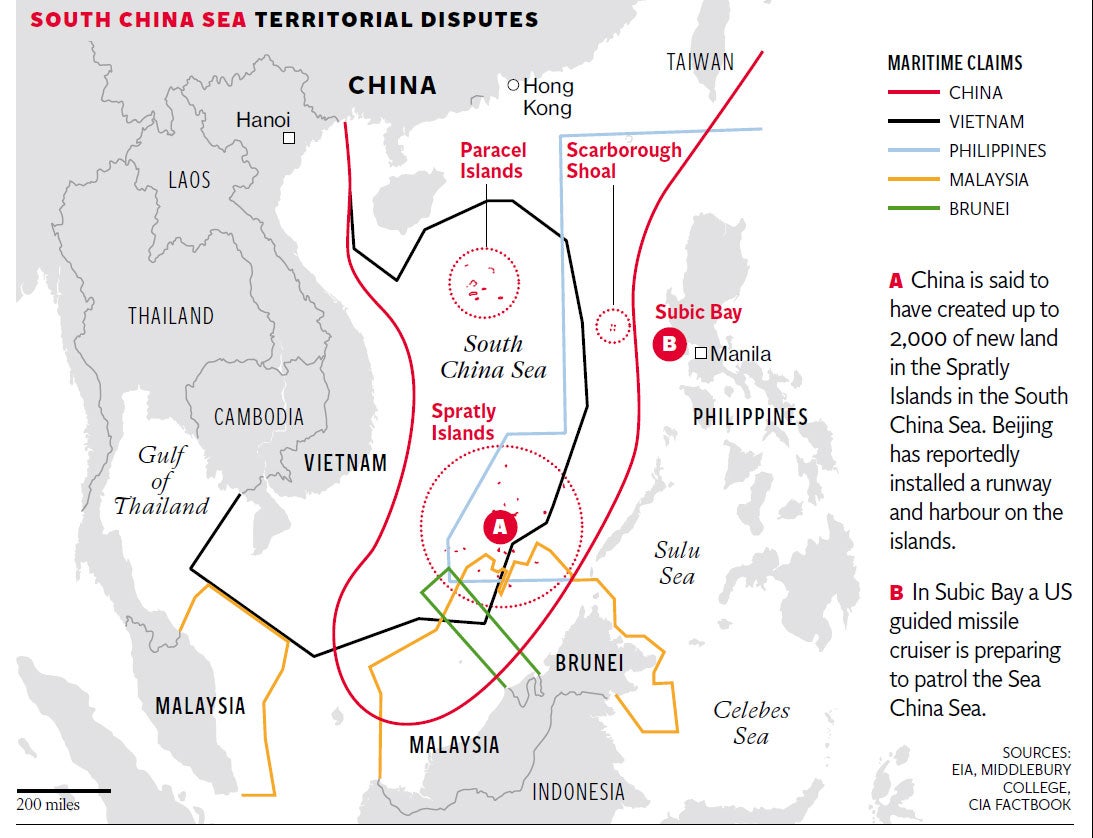South China Sea ruling: Hague tribunal rules Beijing has 'no legal basis' to claim waters or resources
The Phillippines challenged the so-called 'nine-dash line' China uses to claim virtually the entire South China Sea

Your support helps us to tell the story
From reproductive rights to climate change to Big Tech, The Independent is on the ground when the story is developing. Whether it's investigating the financials of Elon Musk's pro-Trump PAC or producing our latest documentary, 'The A Word', which shines a light on the American women fighting for reproductive rights, we know how important it is to parse out the facts from the messaging.
At such a critical moment in US history, we need reporters on the ground. Your donation allows us to keep sending journalists to speak to both sides of the story.
The Independent is trusted by Americans across the entire political spectrum. And unlike many other quality news outlets, we choose not to lock Americans out of our reporting and analysis with paywalls. We believe quality journalism should be available to everyone, paid for by those who can afford it.
Your support makes all the difference.China has "no legal basis" to claim historic rights to waters or resources in the South China Sea, an international tribunal has ruled.
The Phillippines challenged the so-called "nine-dash line" China uses to claim virtually the entire South China Sea.
The dispute centered on waters through which an estimated $5 trillion in global trade passes through each year. The waters are also home to rich fishing stocks and a potential wealth of oil, gas and other resources.
The Philippines also asked the Hague-based tribunal to rule on whether several disputed areas are outcrops, reefs or islands, a move aimed at clarifying the extent of territorial waters they are entitled to or if they can project exclusive economic zones.

According to the Guardian, the court declared that “although Chinese navigators and fishermen, as well as those of other states, had historically made use of the islands in the South China Sea, there was no evidence that China had historically exercised exclusive control over the waters or their resources.
“The tribunal concluded that there was no legal basis for China to claim historic rights to resources within the sea areas falling within the ‘nine-dash line’.”
The panel said that any historic rights to resources that China may have had were wiped out if they are incompatible with exclusive economic zones established under a UN treaty.
The Philippines' foreign minister welcomed the ruling as a "milestone decision".
"The Philippines reiterates its abiding commitment to efforts of pursuing the peaceful resolution and management of disputes with the view of promoting and enhancing peace and stability in the region," Foreign Affairs Secretary Perfecto Yasay told a news conference.
China reportedly censored news of the ruling, replacing the BBC's broadcast with a black screen as the channel prepared to report on the judgement.
Users on Weibo opposed the ruling and said Western media is biased towards the Philippines.
“Look at the Western media, it’s all criticising China, BBC, NHK – Western media is unfair, and has intentions,” one commenter wrote, the Hong Kong Free Press reports.
Another said: “Although BBC and CNN wants to lead the discussion in favour of the Philippines, but excuse me? The South China Sea carries China’s name! The sea was China’s, is China’s and will always be China’s.”
China, which has boycotted the case, has summoned its demobilized sailors and officers for training drills, state media confirmed, in exercises that apparently started just days ago.
The People's Liberation Army Daily newspaper said on social media late Monday that Chinese navy reserves have been called up to perform "functional tasks." The post followed online rumors that reservists in central Chinese provinces were called up for an unspecified mission from July 10 to July 22.
The PLA Daily's post did not explicitly link the call-up to the South China Sea ruling, but said that decommissioned naval officers and reserves hold "normal trainings every year, after which they are able to proficiently operate naval vessels and equipment."
It added: "'If there is war, we must answer the call' is the sentiment in the hearts of many demobilized veterans."
Responding to the ruling, Catherine West, Shadow Foreign Office Minister said: “This historic ruling brings much-needed clarity and it is important that its conclusions are respected by all parties.
“As a key trading partner with China, the UK has a responsibility to insist that this decision must be upheld. Ministers should press upon their Chinese counterparts the importance of recognising the legitimacy of the Court and of scaling back China’s activities in the South China Sea.
“It is essential for freedom of navigation and international security that peaceful and diplomatic solutions are sought to the disputes in the region, in full accord with the UN Convention on the Law of the Sea, to which China is a signatory.”
In February, China deployed surface-to-air missiles on disputed islands in the South China Sea.
American and Taiwanese officials said missile batteries had been set up on Woody Island, part of the Paracels chain that has been under Chinese control for more than 40 years – but which is also claimed by Taiwan and Vietnam.
Additional reporting by Reuters
Join our commenting forum
Join thought-provoking conversations, follow other Independent readers and see their replies
0Comments